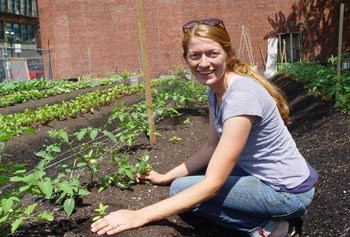Economic and Social Development Program Marks 15 Years

06/26/2013
By Sandra Seitz
A community banker, an urban farmer, a labor organizer, the director of a small business center – these are just some of the diverse members in a special class: alumni of the Economic and Social Development of Regions program.
Fifteen years after its founding as a pioneer of interdisciplinary study, the program known as RESD (rez-dee, for its original name, Regional Economic and Social Development) can point to an impressive array of alumni around the world. Within the Merrimack Valley and greater Boston, alums are making a difference, both economically and in the social fabric of their communities.
“Economic and Social Development offers a deep commitment to an interdisciplinary approach to the problems of the world,” says Political Science Prof. John Wooding, program director. “Our purpose is to connect the students’ intelligence with action, to bridge analysis with purpose. With this foundation, alums can be anywhere – teaching high school in Indonesia, developing clean energy policy, becoming an entrepreneur for social change.”
One of the social entrepreneurs is 2012 graduate Lydia Sisson. Just over a year ago, Sisson launched the Mill City Grows enterprise “with the goal of empowering Lowell residents to create a safe, healthy food system through access and education,” she says.
Three community gardens, dotted around the city, provide more than 80 gardeners with growing space, supervision and access to tools and training; the program has a long waiting list for plots. This year, Mill City’s Urban Community Farm opened as an educational and market-driven operation, with retail sales in the Lowell farmer’s market and a traveling market bus that visits neighborhoods.
Why farming? “What farming did for me was provide literal physical work,” says Sisson, who, as an undergrad at Vassar, did work-study for a farm project. “With so many social ills to confront, it can be daunting and farming is very tangible.”
Sisson entered UMass Lowell after successfully running her own farm, because, she says, “I felt detached from social justice issues. RESD gave me the professional transition, the time to create a project around food justice and the community connections to make it happen.”
Different Paths, Same Program
Part of the program’s very first cohort of three students entering in 1998, Susan de Mari says, “In a way, we each graduated with a different degree because of our ability to focus on a particular interest. You could blaze your own trail, while learning from the best of the best.”
De Mari works at the Lowell Five community bank “with a sense of pride about the ways the private sector can contribute to the public good,” she says. “The bank was founded in 1854 for mill workers, so they could open an account with a nickel.”
The RESD program gave de Mari great experience. The Lowell city manager taught one course, for example, and brought the budget proposal to class.
“He told us, ‘You have to cut this much.’ You really go through the process,” says de Mari, who began her career in state and city government. “There’s honor in public service and a need for people to work in government for the right reasons.”
Students arrive from varied backgrounds, like Stacie Hargis, who’d been working in graphic arts in Florida when she decided on the program.
“I wanted to pursue a master’s about the wage gap, the economic aspects of public policy,” says Hargis, who graduated in 2008, in a class nearly 10 times as larger as the first, with students from several continents. “The program lined up with what I was passionate about.”
Hargis soon became deeply engaged in the region through research projects. After working for U.S. Rep. Niki Tsongas on small business assistance, housing and economic development, she became director of the Merrimack Valley Small Business Center, providing resources and technical support for entrepreneurs – especially for low-income, immigrant and minority communities – where she has started a microloan program.
“Anyone interested in seeing change happen, in applying policy to the regional community, or in organizing around social issues should consider RESD,” says Hargis. “The skills and learning translate into many different fields.”
Keeping It Real
The faculty of Economic and Social Development represent many disciplines, which infuses their teaching.
“The program breaks down the traditional separation of economic models. You look at an issue, not through one lens, but through many,” says recent graduate Ethan Snow, who came to RESD because of its reputation and uniqueness.
Snow is the political and communications director for UniteHere!, a labor organization for New York and New England industries that can’t easily be outsourced, such as warehousing, food service and retail.
“My work is exciting in its diversity. One day I’m organizing new workers, the next I’m at the State House to support legislation and the next writing press releases,” he says. “That comes from the broad understanding I gained from RESD.
“The real value of the program is its faculty,” Snow adds. “The professors are extraordinary in their accomplishments, yet they keep it real in the classroom. It’s what they love to do – teach and inspire others to do research and real work in the real world.”
